MY LITTLE (PARANOID) PONY
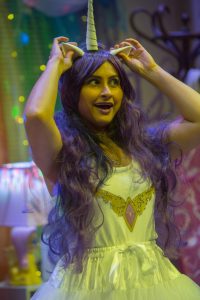 If you believe The Antelope Party, a Theater Wit two-act world premiere, fascism could soon be coming to a neighborhood near you. The “party” reference is political, not social. The blatant thrust of Eric John Meyer’s new work is that purity is no defense against paranoia. Indeed, one kind of role-playing can too easily usher in its opposite.
If you believe The Antelope Party, a Theater Wit two-act world premiere, fascism could soon be coming to a neighborhood near you. The “party” reference is political, not social. The blatant thrust of Eric John Meyer’s new work is that purity is no defense against paranoia. Indeed, one kind of role-playing can too easily usher in its opposite.
The very speculative setting for Jeremy Wechsler’s pile-driving staging is a Pittsburgh apartment sometime in this decade. Surrounded by set designer’s Joe Schermoly’s bleak industrial landscapes, the perkily-decorated, rainbow-colored home of sweet guy Ben (Edward Marare) is a refuge from recession. (Like all his friends, Ben is notably nice ’” but only at the start.) An “R&R” shelter from life’s storms, Ben’s favorite make-believe is The Rust Belt Ponies Meet-Up Group, five adult devotes of the kiddie-phenom “My Little Pony.” As they seek to recreate the mythical kingdom of Equestria, Brony Ben’s fan club is just the cutest clique ever!
These somewhat stunted souls ’” brassy “Pegasister” Maggie (Anu Bhatt), shy Shawn (Will Allan), wary Doug (Evan Linder), and submissive Rachel (Annie Munch) ’” enjoy dressing up like their favorite quadruped characters. Together they create fantasy tales involving heroic horses and special spells, with possibly a magic princess thrown in for contrast. Briefly trying to join this cloying cult is Jean (Mary Winn Heider), a 9/11 “truther” who initially decides that the Rust Belt Ponies are not a good fit.
But there’s another group in the ’˜hood and their goal is not to recreate Hasbro toys. It’s a neighborhood-watch group. These self-appointed supremacists sinisterly evolve into a paranoid vigilante band called The Antelope Party. (If you don’t get their outside connection, their un-subtle slogan “Make Antelopes Great Again” should make the link.)
Supposedly “concerned citizens,” these unseen guardians of law and order battle with the purportedly delinquent “Gutter Punks,” shaking down the streets with extortionist offers of protection. Calling their chosen adversaries “coyotes” and “dogs,” the moosehead-wearing “antelopes” vow destruction on spies or traitors in their territory. They brag that the bold lies they propagate (enshrined in their Book of Antlers) are bravely false ’” “a fiction that admits its own invention.” Alternate facts, anyone?
Slowly this Antelope Party, who number some of Maggie’s family, starts to make inroads among the once-innocent, happily-trusting Ponies, persuading them to distribute hate literature and expose traitors. The reasons for conversion differ ’” peer pressure, threats and intimidation, the cool lure of adventure, but never any overt racism or classism. “Act normal” is the byword. Meyer is at his best when showing how ordinary frictions among friends ’” misunderstandings about Maggie’s “phone phobia,” for instance ’” can crack into major rifts.
By play’s end the former friends are no longer able, as the press release puts it, “to see the magic in Everypony”: They’ve morphed, all too predictably, into agents of Antelope darkness. Alas, this process feels a bit too pat, schematic and pre-determined, with too few surprises and no reversals along the 130-minute way. It’s almost as if the playwright had accepted a dare: How can I transform the most innocuous and gentle play group into a Trump-like hatefest, proving that even the City of Brotherly Love is susceptible to civic corruption?
Well, despite five well-keyed performances from Wechsler’s excellent ensemble, succeeding in this wager is not so great a feat ’” not when the outcome of this evil role-playing seems so heavy-handedly creepy and cynical. We get the authoritarian point long before the play’s “new normal” ending. As an object lesion or cautionary tale, The Antelope Party is not exactly breaking news. Tell me something I don’t know.
The Antelope Party
Theater Wit, 1229 W. Belmont Ave.
Thurs-Sat at 8; Sun at 2
ends on February 24, 2018
for tickets, call 773.975.8150 or visit Theater Wit
for more shows, visit Theatre in Chicago
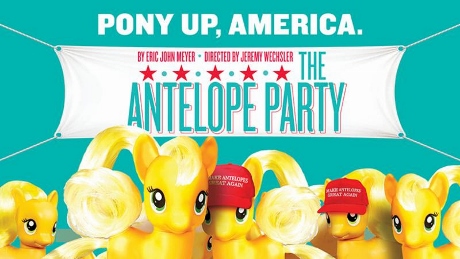
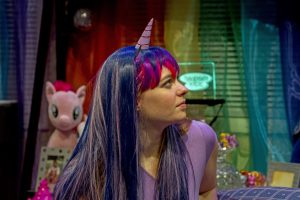
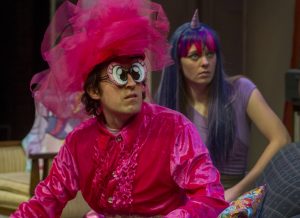
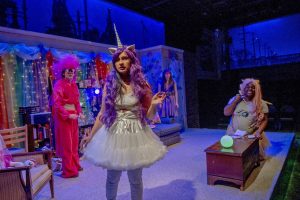
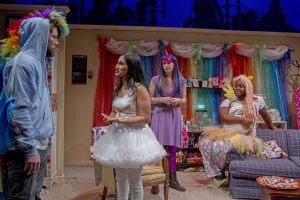
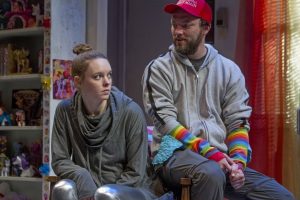
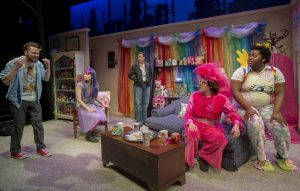
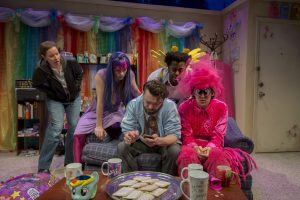
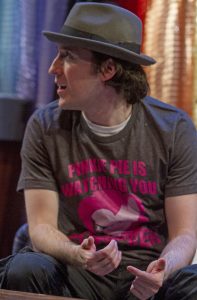

{ 2 comments… read them below or add one }
Just saw this play today and loved it! One quick note is that the setting is Pittsburgh, not Philadelphia – I think its significant because Pittsburgh is definitely more squarely in the post-industrial, rust belt-type part of America that the play is referencing.
Thanks for noticing, Sarah. It’s a powerful distinction. The change has been made.